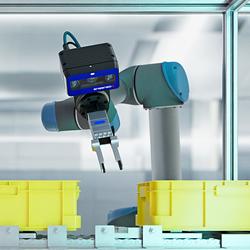Raytheon to begin Phase 3 on DARPA Persistent Close Air Support program
PCAS designed to provide quicker close air support for ground troops
TUCSON, Ariz., Feb. 4, 2014 -- Raytheon Company (NYSE: RTN) is beginning Phase 3 of the Defense Advanced Research Projects Agency's Persistent Close Air Support (PCAS) program. DARPA has exercised its Phase 3 option with Raytheon, an 18-month, $25.5 million effort scheduled to culminate in a series of flight tests and live-fire demonstrations.
PCAS software could enable ground troops to receive close air support sooner by improving coordination among joint terminal attack controllers, airborne sensors and weapons. PCAS is designed to improve human-machine interfaces for both ground and air personnel by inserting autonomous algorithms in the decision chain, and digitally sending shared situational awareness messages.
Originally designed for the A-10 Thunderbolt, the program was expanded in 2013 to develop a platform- and sensor-agnostic electronics suite that could be easily integrated onto multiple platforms. The system is also designed to work with a variety of legacy radios to facilitate transition to multiple users.
"Our ground troops deserve the quickest response possible when close air support is needed," said Thomas R. Bussing, vice president of Raytheon Missile Systems' Advanced Missile Systems product line. "Raytheon's PCAS solution is designed to reduce the minutes it takes to deliver that critical support, and give warfighters the most effective protection possible."
Phase 3 was awarded in the third quarter of 2013. Raytheon is the systems integrator for PCAS and leads an industry team comprised of Rockwell Collins, General Electric, BAE Systems and 5-D Systems. Raytheon brings its expertise in overall systems integration, weapons, aircraft integration and unmanned aircraft system ground control stations to PCAS.
About Raytheon
Raytheon Company, with 2013 sales of $24 billion and 63,000 employees worldwide, is a technology and innovation leader specializing in defense, security and civil markets throughout the world. With a history of innovation spanning 92 years, Raytheon provides state-of-the-art electronics, mission systems integration and other capabilities in the areas of sensing; effects; and command, control, communications and intelligence systems, as well as cyber security and a broad range of mission support services. Raytheon is headquartered in Waltham, Mass. For more about Raytheon, visit us at www.raytheon.com and follow us on Twitter @Raytheon.
Featured Product

3D Vision: Ensenso B now also available as a mono version!
This compact 3D camera series combines a very short working distance, a large field of view and a high depth of field - perfect for bin picking applications. With its ability to capture multiple objects over a large area, it can help robots empty containers more efficiently. Now available from IDS Imaging Development Systems. In the color version of the Ensenso B, the stereo system is equipped with two RGB image sensors. This saves additional sensors and reduces installation space and hardware costs. Now, you can also choose your model to be equipped with two 5 MP mono sensors, achieving impressively high spatial precision. With enhanced sharpness and accuracy, you can tackle applications where absolute precision is essential. The great strength of the Ensenso B lies in the very precise detection of objects at close range. It offers a wide field of view and an impressively high depth of field. This means that the area in which an object is in focus is unusually large. At a distance of 30 centimetres between the camera and the object, the Z-accuracy is approx. 0.1 millimetres. The maximum working distance is 2 meters. This 3D camera series complies with protection class IP65/67 and is ideal for use in industrial environments.
